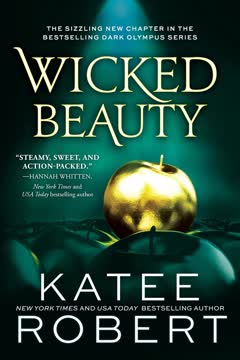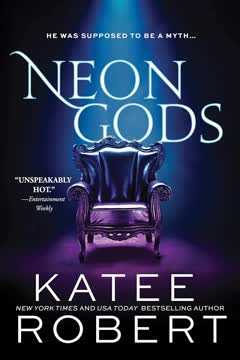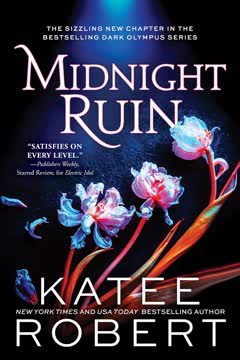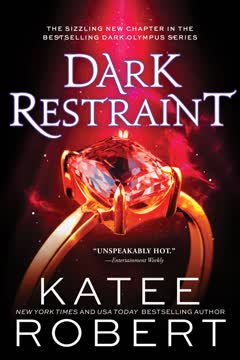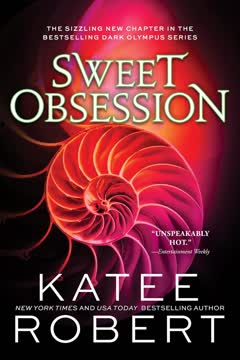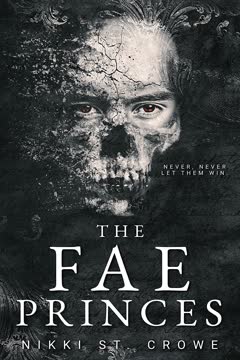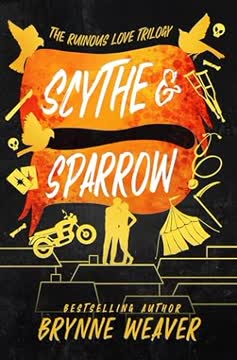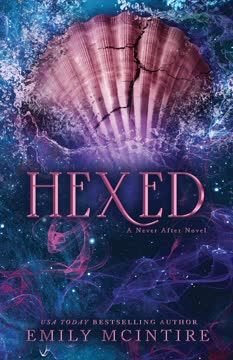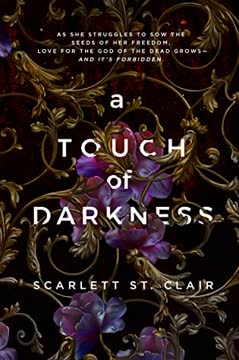Plot Summary
Late for Destiny
Helen Kasios, daughter of the former Zeus and sister to the current, is late to a pivotal Olympus party. Tonight, her brother Perseus (now Zeus) will announce the tournament to replace Ares, one of the Thirteen who rule the city. Helen, long underestimated and used as a pawn, is determined to compete for the title herself, seeking freedom and power. The city's elite gather, each with their own ambitions, and Helen steels herself for the challenge ahead, knowing that winning Ares is her only chance to escape her family's manipulations and claim her own destiny.
Ares's Tournament Announced
The death of the old Ares opens the rare opportunity for anyone—regardless of birth or status—to compete for the title. Perseus announces the three-trial tournament, but with a twist: the winner will also marry Helen, making her the prize. The city buzzes with excitement and speculation. Achilles and Patroclus, close friends and lovers, plot to enter as a team, determined to win both the title and the political power it brings. Helen is blindsided by her brother's decision, feeling betrayed and objectified, but her resolve only hardens.
Helen Becomes the Prize
In a private confrontation, Helen lashes out at her siblings for making her a prize in the tournament. Perseus insists it's for the good of Olympus, demanding her compliance. Eris, her sister, is unsympathetic, and Helen realizes she's alone. Callisto, her sister-in-law, slyly encourages Helen to defy expectations and compete anyway, planting the seed for Helen to become both champion and prize. Helen's anger and pain crystallize into determination—she will fight for Ares, not as a pawn, but as a contender.
Champions Step Forward
The city's strongest step forward: Achilles, Patroclus, Paris, Hector, Atalanta, the Minotaur, Theseus, and others. Old wounds and rivalries surface, especially between Helen and her ex, Paris, who is eager to win her back. Achilles and Patroclus strategize, planning to use their bond to reach the final trial together. Helen, in secret, submits her name as a champion, determined to upend the rules and claim her fate. The stage is set for a battle not just of strength, but of wits, alliances, and betrayals.
Helen's Defiance
Helen's entry as a champion is revealed at the opening ceremony, stunning the city and infuriating her brother. She faces skepticism and scorn, but also admiration for her audacity. The champions are sequestered together, tensions simmering as old lovers, enemies, and strangers are forced into close quarters. Helen's presence as both prize and competitor disrupts alliances and strategies, making her both target and inspiration. She steels herself for the trials, knowing she must prove herself to everyone—including herself.
Allies and Enemies
In the champions' quarters, Helen navigates a minefield of threats and temptations. Achilles and Patroclus struggle with their growing attraction to her, even as they vow to keep their focus on victory. Paris's obsession turns menacing, while Atalanta and others weigh alliances. Helen's vulnerability and strength draw both admiration and danger. The lines between ally and enemy blur, as desire, jealousy, and ambition threaten to unravel the careful plans of all involved.
The First Trial
The first trial is a brutal obstacle course, designed to eliminate the weak. Helen, underestimated by most, forms a temporary alliance with Atalanta and uses her athleticism and cunning to survive. Achilles and Patroclus excel, but Paris and the Minotaur reveal their own ruthlessness. Helen's victory is hard-won, and she earns grudging respect. Yet, the threat of violence and sabotage looms, and Helen realizes that surviving the trials will require more than strength—it will demand trust, sacrifice, and the willingness to fight dirty.
Dangerous Attractions
The enforced proximity and high stakes ignite a dangerous triangle between Helen, Achilles, and Patroclus. Their mutual attraction simmers, leading to moments of vulnerability, jealousy, and explosive passion. Sex becomes both escape and battleground, blurring the lines between ally and rival. Meanwhile, Paris's manipulations and the Minotaur's menace escalate. Helen's growing bond with Achilles and Patroclus offers comfort, but also threatens to distract them from the deadly game they're playing.
The Second Trial Maze
The second trial is a labyrinth, with keys hidden and only five allowed to escape. Champions turn on each other, alliances shatter, and betrayals abound. Helen uses her agility and intelligence to outmaneuver her foes, but is injured by Theseus. Patroclus is battered by Hector, and Achilles must choose between victory and saving his lover. Paris cheats his way through, while the Minotaur proves nearly unstoppable. Helen, Achilles, Patroclus, Paris, and the Minotaur emerge as the final five, but at great cost.
Betrayals and Bruises
The aftermath of the maze trial leaves the champions physically and emotionally battered. Patroclus's injuries threaten his place in the final trial, and Helen's bruises are matched by her shaken confidence. Achilles is torn between his ambition and his love for Patroclus—and his growing feelings for Helen. Paris's cruelty intensifies, and the Minotaur's true intentions become clearer. As the final trial approaches, the trio must decide if their bond is strong enough to survive the coming bloodshed.
The Final Five
The last trial is a gladiatorial combat—no alliances, no mercy. Achilles, Patroclus, Helen, Paris, and the Minotaur face off in a brutal, sand-filled arena. Achilles and Patroclus fight to protect each other and Helen, but the Minotaur's violence and Paris's treachery threaten to destroy them all. Helen's cunning and courage are put to the ultimate test as she faces not just her enemies, but the possibility of losing those she loves. Blood is spilled, sacrifices are made, and the cost of victory becomes heartbreakingly clear.
Blood on the Sand
In the chaos of the final battle, Patroclus is gravely wounded protecting Helen. Achilles, desperate and furious, is eliminated by Paris's cowardly attack. Helen, alone and outnumbered, must summon every ounce of strength and resolve to defeat Paris and the Minotaur. In a stunning display of skill and will, she claims victory, but the triumph is hollow—her heart is shattered by the loss and betrayal that paved her path to power.
Aftermath and Ascension
Helen is crowned Ares, but the celebration is muted by grief and uncertainty. Achilles and Patroclus, both wounded in body and spirit, must decide if they can forgive, heal, and build a future together—and with Helen. The city faces new threats from within and without, and Helen must prove herself as a leader, not just a survivor. The trio's love, tested by ambition and sacrifice, becomes the foundation for a new kind of power in Olympus.
The Cost of Victory
As Helen takes her place among the Thirteen, she confronts the true cost of her ambition. Achilles and Patroclus, recovering from their wounds, must choose between old loyalties and a new life with Helen. The city's political landscape shifts, and the threat of war looms. Helen, Achilles, and Patroclus must decide if their love can survive the scars of the tournament—or if victory has made them strangers to each other.
A New Olympus
In the end, Helen, Achilles, and Patroclus choose each other, forging a partnership that defies tradition and expectation. Together, they vow to protect Olympus from the dangers ahead, drawing strength from their hard-won love and the lessons of the past. Their union—equal parts passion, pain, and hope—becomes a symbol of a new era for the city: one where power is shared, love is chosen, and even the most wicked beauty can find her happily ever after.
Characters
Helen Kasios
Helen is the daughter of the former Zeus and sister to the current, raised in a gilded cage and used as a pawn in Olympus's political games. Beautiful, clever, and deeply wounded by her family's betrayals, she craves agency and respect. Her decision to compete for Ares is both rebellion and self-assertion, a desperate bid to define herself on her own terms. Helen's journey is one of transformation: from objectified prize to powerful leader. Her relationships—with her siblings, her enemies, and especially with Achilles and Patroclus—reveal her vulnerability, her capacity for love, and her willingness to fight for her own future. She is both the face that launched a thousand ships and the hand that steers her own destiny.
Achilles Kallis
Achilles is an orphan who clawed his way up from nothing to become Athena's second-in-command. Charismatic, impulsive, and fiercely competitive, he is determined to win Ares at any cost, believing power is the only way to secure respect and safety. His relationship with Patroclus is the anchor in his life, but Helen's arrival disrupts his certainty, awakening desires and vulnerabilities he struggles to control. Achilles's journey is one of learning the limits of ambition, the value of love over victory, and the pain of sacrifice. His bravado masks deep insecurities, and his willingness to fight for those he loves—even at the cost of his dreams—reveals a heart as formidable as his body.
Patroclus Fotos
Patroclus is the brains behind Achilles's brawn, a man who prefers logic and planning to violence. Raised by loving mothers who fled Olympus's political games, he is both an outsider and an insider, able to see the city's machinations with clear eyes. His love for Achilles is deep and abiding, but Helen's entrance into their lives awakens a longing for connection and recognition. Patroclus is the moral center of the trio, often torn between loyalty, desire, and self-preservation. His journey is one of self-acceptance, learning to claim what he wants, and discovering that sometimes the heart's logic is the only one that matters.
Paris Chloros
Paris is Helen's former boyfriend, a man whose handsome exterior hides a controlling, vindictive nature. Obsessed with reclaiming Helen, he enters the tournament determined to win her back—by force if necessary. Paris's cruelty and cunning make him a formidable foe, but his inability to see Helen as anything but a possession is his undoing. He represents the toxic legacy of Olympus's power games, and his downfall is both a personal and symbolic victory for Helen.
Perseus Kasios (Zeus)
Perseus, Helen's brother, inherits the title of Zeus after their father's death. He is determined to maintain order in Olympus, even at the cost of his sister's happiness. Perseus's love is conditional, his loyalty to the city outweighing family bonds. He is both antagonist and tragic figure, a man shaped by trauma and duty. His relationship with Helen is fraught with betrayal, but also a grudging respect for her strength.
Eris Kasios (Aphrodite)
Eris, Helen's sister, is newly crowned Aphrodite and revels in the power and drama of Olympus. She is both confidante and betrayer, supporting Helen when it suits her and undermining her when it doesn't. Eris embodies the city's seductive, dangerous allure, and her actions force Helen to confront the limits of family loyalty.
Atalanta
Atalanta is one of the few female champions, a skilled fighter with scars—literal and emotional—from Olympus's battles. She forms a brief alliance with Helen, recognizing a kindred spirit. Atalanta's presence challenges the city's gendered expectations and offers Helen both friendship and rivalry.
The Minotaur
The Minotaur is a stranger to Olympus, entering the tournament with his brother Theseus. His size and violence make him a terrifying opponent, and his true motives are tied to outside threats facing the city. The Minotaur represents the dangers lurking beyond Olympus's walls—and the consequences of underestimating outsiders.
Theseus
Theseus, the Minotaur's brother, is equally menacing, bringing with him a worldview that sees women as property and power as a right. His clashes with Helen are both physical and ideological, and his defeat is a turning point in the tournament.
Callisto Dimitriou (Hera)
Callisto, Perseus's wife and the new Hera, is an enigma—aloof, sharp-tongued, and quietly rebellious. She encourages Helen to defy her family and claim her own fate, acting as both provocateur and unlikely supporter. Callisto's presence highlights the shifting alliances and hidden agendas that define Olympus.
Plot Devices
Tournament Structure and Trials
The narrative is structured around the three trials to become Ares, each designed to eliminate the weak and reveal the true nature of the competitors. The trials—obstacle course, maze, and gladiatorial combat—are not just physical challenges, but crucibles for character, forcing the champions to confront their fears, desires, and loyalties. The structure creates a relentless pace, ratcheting up tension and stakes with each round, while also providing a framework for shifting alliances, betrayals, and moments of heroism.
Dual and Triple POV
The story alternates between Helen, Achilles, and Patroclus, allowing readers to experience the events—and the evolving love triangle—from inside each character's mind. This device heightens dramatic irony, as each struggles with their own insecurities and desires, often misreading the others' intentions. The shifting POVs also allow for nuanced exploration of power, vulnerability, and the ways love and ambition can both heal and destroy.
Subversion of Myth and Gender Roles
The novel draws on the mythic resonance of Helen, Achilles, and Patroclus, but subverts expectations: Helen is not a passive prize, but a fierce contender; Achilles is not invincible, but deeply human; Patroclus is not a sidekick, but a partner and equal. The tournament's "prize" is both a woman and her own agency, and the narrative continually interrogates who gets to wield power—and at what cost.
Foreshadowing and Political Intrigue
Throughout the story, hints of outside dangers, the fragility of Olympus's barrier, and the ambitions of outsiders like the Minotaur and Theseus foreshadow future upheaval. The political machinations of the Thirteen, the manipulations of Perseus and Eris, and the ever-present threat of betrayal create a sense of unease and complexity, ensuring that victory in the tournament is only the beginning of a larger, more dangerous game.
Erotic Tension as Character Development
The intense, explicit sexual encounters between Helen, Achilles, and Patroclus are not mere titillation—they are crucibles for vulnerability, trust, and transformation. Sex becomes a way for the characters to reveal their true selves, to heal old wounds, and to forge a bond that defies the city's rules. The love triangle is not a distraction from the plot, but its emotional core, driving the characters to risk everything for each other.
Analysis
Wicked Beauty is a fierce, subversive reimagining of mythic power struggles, using the lens of a deadly tournament to explore themes of agency, ambition, and the cost of victory. At its heart, the novel asks: Who gets to write their own story? Helen's journey from pawn to champion to Ares is a reclamation of self, a refusal to be defined by others' desires or the roles assigned to her. The love triangle with Achilles and Patroclus is not just a romantic subplot, but a crucible for exploring vulnerability, trust, and the possibility of building something new from the ashes of old wounds. The book interrogates the toxic legacies of power—familial, political, and sexual—while offering a vision of love and leadership rooted in equality and choice. In a world where every alliance is a risk and every victory comes at a price, Wicked Beauty insists that true power lies not in domination, but in the courage to choose—and be chosen—in return. The result is a story that is as emotionally resonant as it is thrilling, offering both a critique and a celebration of the myths we inherit and the futures we dare to claim.
Last updated:
Review Summary
Wicked Beauty receives mixed reviews, with an average rating of 3.93 out of 5. Many readers praise the steamy romance and character dynamics between Helen, Achilles, and Patroclus. The competition plot and world-building receive both positive and negative feedback. Some readers appreciate the feminist twist on Helen's character, while others feel the book lacks depth in plot development. The polyamorous relationship is a point of contention, with some readers loving the dynamic and others finding it problematic. Overall, fans of the series enjoy the book, while others find it disappointing.
